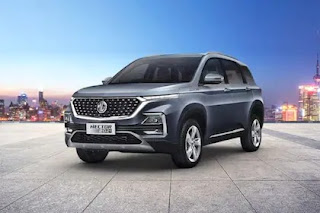Latest Electric cars in India | The Pros and Cons
The pros and cons:
Let's summarise the three types of electrically-powered cars:Regular hybrid (eg - MG ZS EUV)
PROS: cheaper, no charging required, no range anxiety, regular petrol engine makes it feel like a regular petrol car
CONS: only very short journeys (a few miles at best) will be fully electric, small battery pack and weak petrol engine means relatively poor performance compared to a normal petrol car or a fully electric car, poor economy when driven hard (like most Prius minicabs in London...), not very spacious for passengers and luggage due to carrying petrol and electric powertrains in one car
Fully electric car (EV)
PROS: powerful electric motor gives much better performance than a regular hybrid, larger battery pack means longer electric running, latest electric cars in India no petrol engine reduces weight and frees up a lot of space, £5000 government rebate, electricity is cheaper and usually less polluting than petrol, privileged parking spaces in certain public placesCONS: Still expensive despite rebate, minimal range capability due to lack of petrol engine backup, resulting range anxiety is a real issue for drivers, question marks over battery life, technology advances will make next-generation massively better and hurt resale value, some driving adaptation required, lengthy recharging required after even a moderate drive
Plug-in Hybrid / range-extender
PROS: powerful electric motor and backup petrol engine give best combination of performance and range, MG Motor India most journeys will be fully electric which is cheaper than petrol, no range anxiety, privileged parking spaces in certain public places
CONS: Very expensive despite rebate, question marks over battery life and resale value, wall socket charging is still slow, lack of space and very heavy due to having petrol engine and fuel tank as well as electric motor and batteries.
CONS: Very expensive despite rebate, question marks over battery life and resale value, wall socket charging is still slow, lack of space and very heavy due to having petrol engine and fuel tank as well as electric motor and batteries.
Electric Car Economics - is it all worth it?
For most people, an electric vehicle is difficult to justify on pure hard-headed economics. Even with a £5,000 rebate from the government, an electric car is expensive. A Nissan Leaf starts at £31,000, so after the government gives you £5K you have spent £26K on a car which would be probably worth about £15K if it had a normal petrol engine. Latest SUV Cars That could conceivably buy you a decade's worth of fuel! And there are still question marks hovering over the long-term reliability of batteries and resale value, which may bite you hard somewhere down the lineElectric Cars and the Environment
Buying a hybrid or electric car because you think you're helping the environment may not be helping that cause as much as you think, if at all. Producing car batteries is a dirty and complicated process, and the net result is that there is a significantly higher environmental impact in building an electric or hybrid car than building a regular petrol or diesel car. So you're starting behind the environmental eight-ball before you've even driven you new green car.Beware of "zero emissions" claims about electric vehicles, because most electricity still comes from fossil fuel sources (like gas or coal) rather than renewable sources, so you are still polluting the atmosphere when you drive, albeit not as much and the effects are not as noticeable to you. If you have your own solar panels or wind farm to power your car, this is much more environmentally friendly.
Range anxiety
The biggest electric car turn-off for car buyers (other than the high purchase price) is the joint problem of very limited range and very slow recharging. In a petrol or diesel car, you can drive for a few hundred miles, pull into a petrol station and five minutes later you are ready to drive for another few hundred miles. In an electric car, you drive for 50-100 miles, then have to stop and charge it for several hours to drive another 50-100 miles.If you only take short journeys and can keep the car plugged in whenever it stops (usually at home or work), this may never be a problem. MG Hector India But you can't expect to jump in the car and drive a couple of hundred miles or get away with forgetting to plug the car in overnight after a journey. You have to be much more disciplined in terms of planning your driving, and allow for recharging. Away from home, this is still a big problem as there are relatively few power sockets available in public parking areas for you to use.
A plug-in hybrid like the MG Hector Company gets around the range anxiety problem, as does a normal hybrid like a Toyota Prius, but you are carting a petrol engine (and fuel) around all the time which you may not need, adding hundreds of kilos of weight and taking up lots of space, so it's a compromise.
So as you can see from all of the above, it's not at all straightforward. You need to carefully consider what sort of driving you will be doing and what you need your car to be able to do.

Comments
Post a Comment